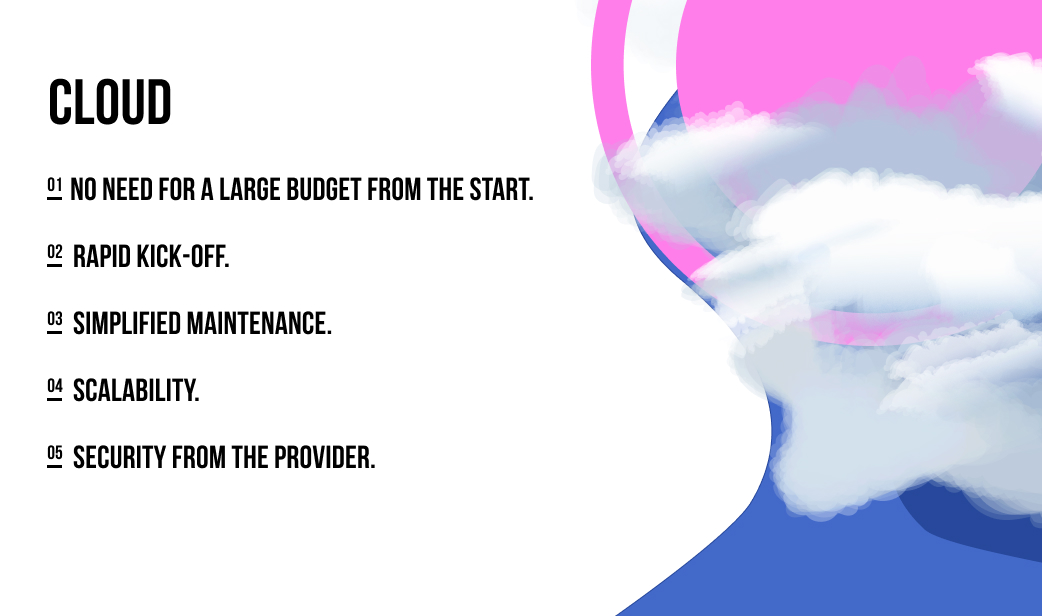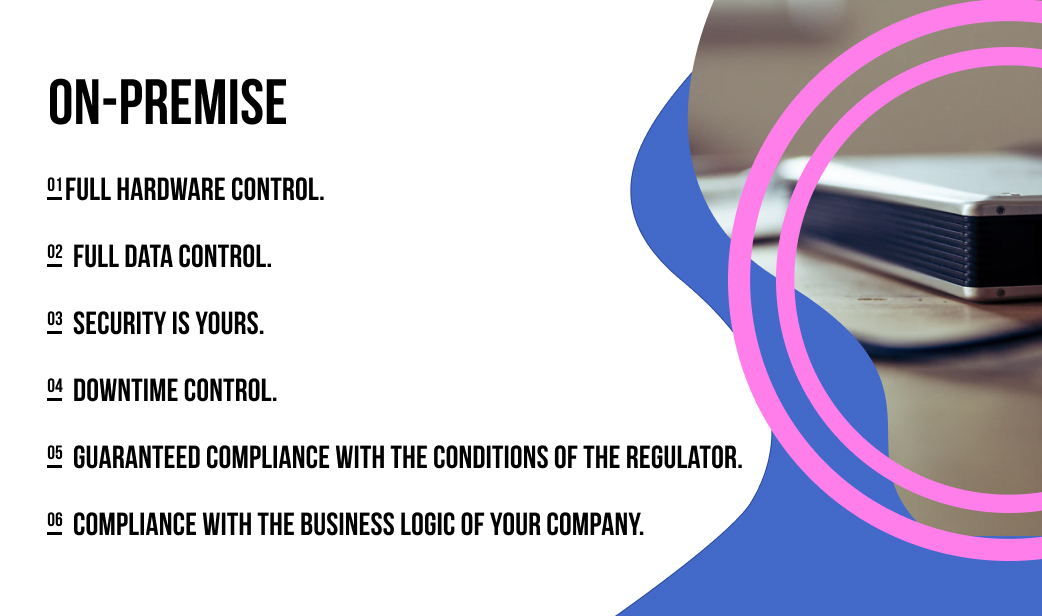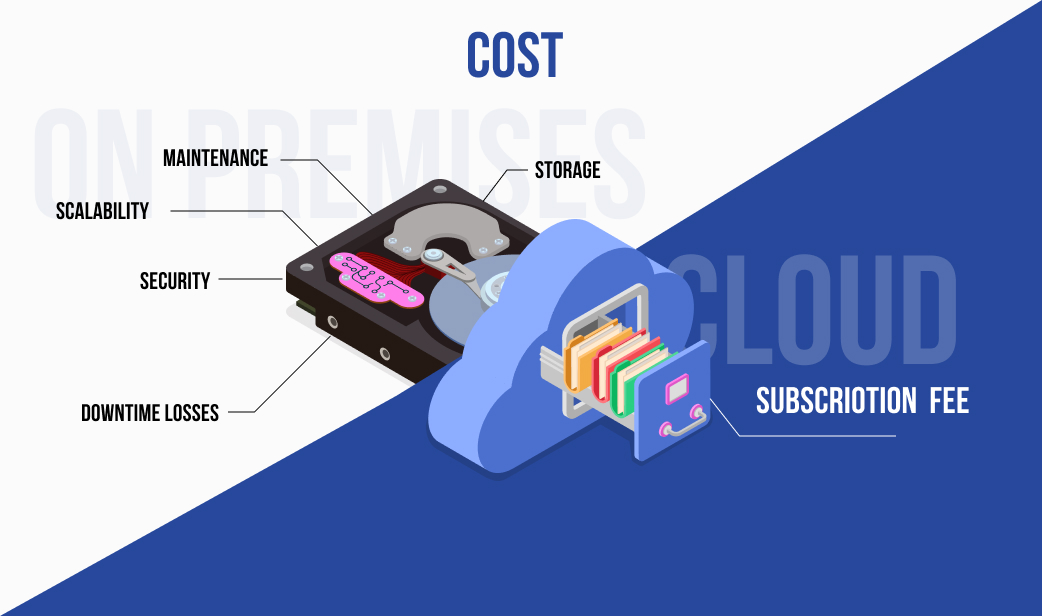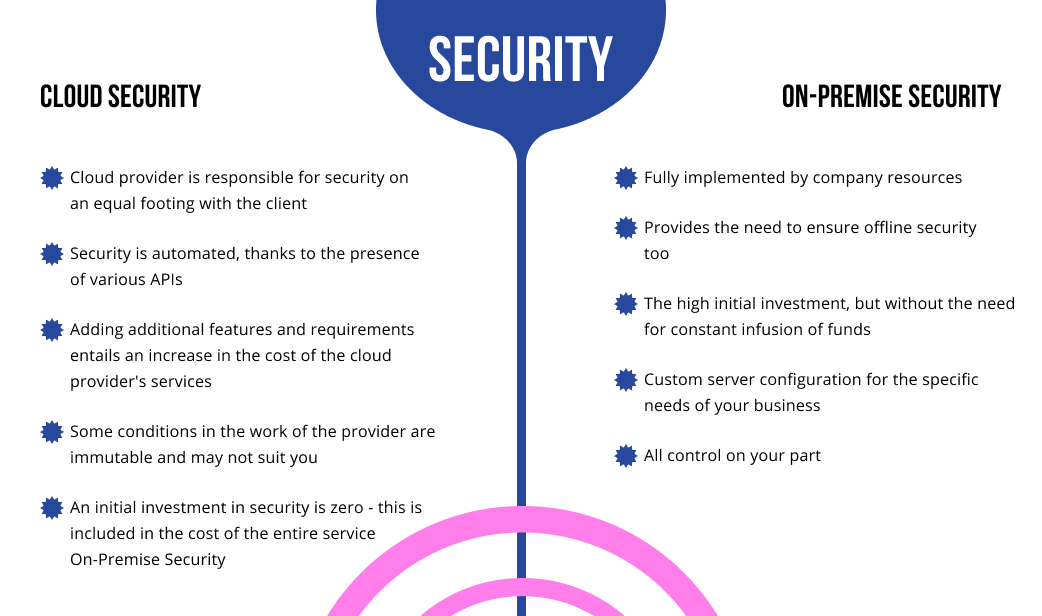On-premise vs Cloud hosting: a comparative analysis


With the development of information technology, the need for solutions that can help contain more and more complex digital products (be it applications, hardware, or software) is increasing. When discussing this issue, business professionals often come to an On-Premise vs Cloud dilemma. Basically, it is a matter of choosing where your products will be hosted. In the case of On-Premise, as the name implies, hosting is carried out on-site, although maintenance can be provided both by the company itself and by a third party. In the case of using cloud solutions, the third party completely take over hosting and maintenance, allowing its clients to unload their staff and get rid of the need to allocate separate teams for these issues.
As elsewhere, the debate between the supporters of both options didn’t appear from scratch. Both options have their pros and cons, which we present to you in this article. We hope that the comparative analysis that we provide you with will help you make the right choice specifically for your case.
Cloud vs On-Premise in terms of security
We would like to start our cloud vs on-premise comparison by briefly describing the benefits of both approaches.
Cloud

- No need for a large budget from the start. Investing in hardware and software for creating a hosting infrastructure is perhaps the most serious cost that awaits you. However, on-premise also includes installation on rented hardware (physical server) that is sometimes less expensive than cloud infrastructure, but there are a number of additional factors to consider here. Since with cloud solutions all infrastructure and its maintenance are carried out on the side, you don’t need large budgets from the very beginning. Most often, such solutions are distributed under an annual subscription, and therefore there is also no need to gather and support a team of specialists who will work with the server. All you need to do is pay once a year.
- Rapid kick-off. In terms of cloud hosting vs on-premise setting up, the first one is really fast. It is very simple and often does not require any investment from your IT teams. Most often, you just need to log into the control panel and you can get to work.
- Simplified maintenance. As we said above, cloud solutions don’t require the maintenance of expensive IT teams. In addition, all support is carried out on the side of the cloud provider, and therefore you only need to report any changes in the operation of your product in time and do not worry about how this will affect your servers.
- Scalability. Often, cloud providers use the power of such giants as AWS or MS Azure, thanks to which they always provide their customers with the opportunity to expand. Simply put, with the vast growth of your company and the increase in the number of your IT processes, you will not need to expand your server room.
- Security from the provider. The security of your data is ensured and guaranteed not only by the cloud provider you have chosen but also by the tech giants mentioned above like Azure and AWS. Your cloud provider will apply its security policy. This allows you to focus on other business processes without bothering yourself with expensive security issues. Provider knows their software better and can tweak OS and infrastructure security settings better.
On-Premise

- Full hardware control. Of course, in the case of On-Premise, you retain full control over your servers, including what hardware is used there (unless you host servers on rented hardware). This helps to achieve greater customization if your company’s business logic requires replacing the capacities of your hardware.
- Full data control. There is no need to share important or even business-critical data with 3rd parties. This can be also a requirement from the side of your business partners (check mutual agreements). Risks that other users (competitors) can access your data because of bugs/errata.
- Security is yours. Many people feel safer when all measures to ensure data security have been taken personally. In addition, there are companies and industries where data simply cannot be stored on third-party cloud servers. Basically, these are government or medical institutions that store sensitive user data. In such situations, it is better to opt for an On-Premise.
- Downtime control. One of the problems associated with cloud servers is that no one there adapts to the specific needs of your business. Downtime, which is a common phenomenon, can seriously harm your company, especially if you and the remote cloud provider are in radically different time zones. Locating the servers on-premise allows you to control when the downtime occurs and how long the uptime will take.
- Guaranteed compliance with the conditions of the regulator. In some industries, especially those related to government or medical structures, there are strict conditions for storing user data. Cloud providers aren’t always able to meet these conditions. In a situation where all control over the servers remains with you, you can be sure that your servers do not violate the rules of the regulators and are ready to adapt if these rules change.
- Compliance with the business logic of your company. It is not uncommon for a business to invest once in creating an on-premise hosting service for its specific needs and provide its maintenance, instead of subscribing to regular payments. This factor entails a potential reduction in hosting costs and guarantees full compliance with the business logic of your company.
As you can see, each of the options has its own strengths, and therefore we aren’t going to persuade you to make any particular choice, but rather we recommend carefully assessing the needs of your business, the available resources, and the potential of both solutions.
Security measures comparison
The next issue that we would like to consider in more detail is cloud vs on-premise security. It is no secret that this is one of the main concerns that entrepreneurs consider before making their choice in favor of a particular decision.
Let’s start with the fact that security in cloud hosting is carried out not by you, but by the cloud provider. Thus, you completely leave this question in the stranger’s hands. Only you decide whether these hands are professional or not and whether you should trust them. Nevertheless, the very issue of security is reduced only to contact with the cloud provider and minimizes the number of spent resources.
As for on-premise servers, here you not only need to ensure standard online security procedures but also ensure offline security. Since the hardware is located locally, you need to provide access to the servers only to those people whom you trust and who have this right. Also, it won’t be superfluous to provide a biometric check at the entrance. In addition, you will need to keep in mind such a case when a former employee who is angry with the company may try to harm you. These are just a few of the concerns about providing offline protection. On the other hand, you won’t depend on anyone and will know what measures have been taken to ensure safety, whether they are sufficient and where to go next.
Cloud Security
- Cloud provider is responsible for security on an equal footing with the client
- Security is automated, thanks to the presence of various APIs
- Adding additional features and requirements entails an increase in the cost of the cloud provider’s services
- Some conditions in the work of the provider are immutable and may not suit you
- An initial investment in security is zero – this is included in the cost of the entire service
On-Premise Security
- Fully implemented by company resources
- Provides the need to ensure offline security too
- The high initial investment, but without the need for constant infusion of funds
- Custom server configuration for the specific needs of your business
- All control on your part
In general, there is no clear answer to the question of which method is safer. First, it depends on the specific situation and the company. Secondly, people are involved in security on cloud servers too. And people can make mistakes in working with both cloud and on-premise servers.
Cloud vs On-Premise cost comparison
The next step is cloud vs on-premise cost comparison. The costing issue is crucial in the process of choosing between the two options. Often, comparing costs, we can conclude that on-premise hosting will require large initial investments while starting on cloud hosting is ideal for startups. However, as we said earlier, there are situations when on-premise hosting can be cheaper due to equipment rental – Hetzner server can cost from €20 to €50 per month, but your expenses won’t be limited to this.

Often, the total cost of hosting is made up of a number of processes such as maintenance, security, storage, scalability, and downtime losses. In general, it is difficult to immediately assess the cost of all these processes in the case of on-premise hosting. At the same time, when working with a cloud solution, you will be dealing with only one fee, but constantly. It is worth remembering that cloud providers invest all the potential risks associated with the processes described above in the cost of their services. Therefore, sometimes it may turn out that on-premise hosting could be cheaper.
Nevertheless, it is very difficult to say something precise on cloud vs on-premise costs issue, due to a large number of unknown variables. If you are interested in the potential transition to the cloud, you can try to calculate the approximate cost of services from MS Azure in this calculator.
To Summarize
As you already understood, the main idea that runs through this material is that there is no clear answer about which of the two options is better. It all depends on the needs and logic of your business, data sensitivity, partners’ agreements, available resources, and many other factors, which are almost impossible to calculate. In this article, we wanted to show you the strengths of both options and push you to a deliberate decision in the on-premise vs cloud dilemma.
FAQ
On-premise infrastructure includes physical space for offline servers and hardware, which also entails additional costs for electricity and other charges.
The key difference between these approaches is that op-premise hosting is carried out using offline hardware – rented or purchased. At the same time, cloud hosting assumes that all the provision and support of your servers will be provided by a third party.
It depends. For example, the human factor leading to a security breach cannot be ruled out in both cases. Here it is only necessary to say that in the case of cloud hosting, the security issue will be on the conscience of the cloud provider, while in on-premise hosting you need to provide not only online, but also offline security yourself.
Build your ideal
software today


